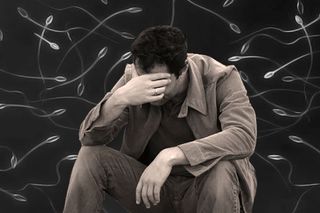
Research Probes Effect of Men’s, Women’s Mental Health on Fertility
Depression in men is linked to lower chances of pregnancy.

Increasingly, research is probing beyond pregnancy to explain kids’ health, and beyond women to explain fertility issues. In the latest of such research, a new study has found depression in male partners is linked to lower pregnancy chances among couples being treated for infertility.
Constrastingly, depression in the female partner was not found to influence the rate of live birth, according to the National Institutes of Health-funded study. However, women’s use of a class of antidepressants known as non-selective serotonin reuptake inhibitors (non-SSRIs) was linked to a higher risk of early pregnancy loss, among women being treated for infertility. SSRIs, another class of antidepressants, were not linked to pregnancy loss.
“Our study provides infertility patients and their physicians with new information to consider when making treatment decisions,” said Dr. Esther Eisenberg, of the fertility and infertility branch at the NIH’s Eunice Kennedy Shriver National Institute of Child Health and Human Development in the US. Eisenberg is the lead author of the study, published in the journal Fertility and Sterility.
The researchers combined data from two previous studies, funded by NICHD’s Reproductive Medicine Network, of men and women receiving non-IVF fertility treatment. In each study, men and women responded to a questionnaire designed to screen for depression. Only the women were asked whether they were taking any antidepressants.
From the two studies, the researchers analyzed data for 1,650 women and 1,608 men. Among the women, 5.96% were rated as having active major depression, compared to 2.28% of the men.
Women using non-SSRIs were roughly 3.5 times as likely to have a first trimester pregnancy loss, compared to those not using antidepressants. Couples in which the male partner had major depression were 60% less likely to conceive and have a live birth than those in which the male partner did not have major depression.
Can depression cause infertility in men?
Depression has been linked to less sexual desire and lower sperm quality in men. Sperm quality is a major factor in fertility, and sustained or chronic stress can have neurological effects similar to depression, and can actually lead to depression in some people.
These findings will undoubtedly inform additional research, but may already have an outsized effect: The authors note that 41% of women seeking fertility treatments have symptoms of depression. In addition, a study of men seeking IVF treatments found that nearly 50% of them experienced depression. With one more bit of information in the puzzle of fertility, couples may be more likely to get the baby they want and the mental health care they need.
Related


Openly Communicating With Kids Linked to Less Risky Behavior
